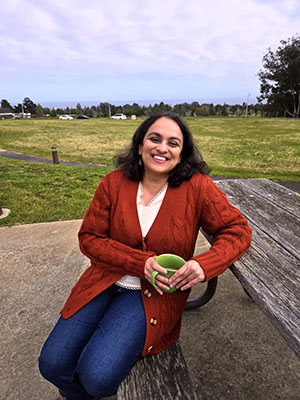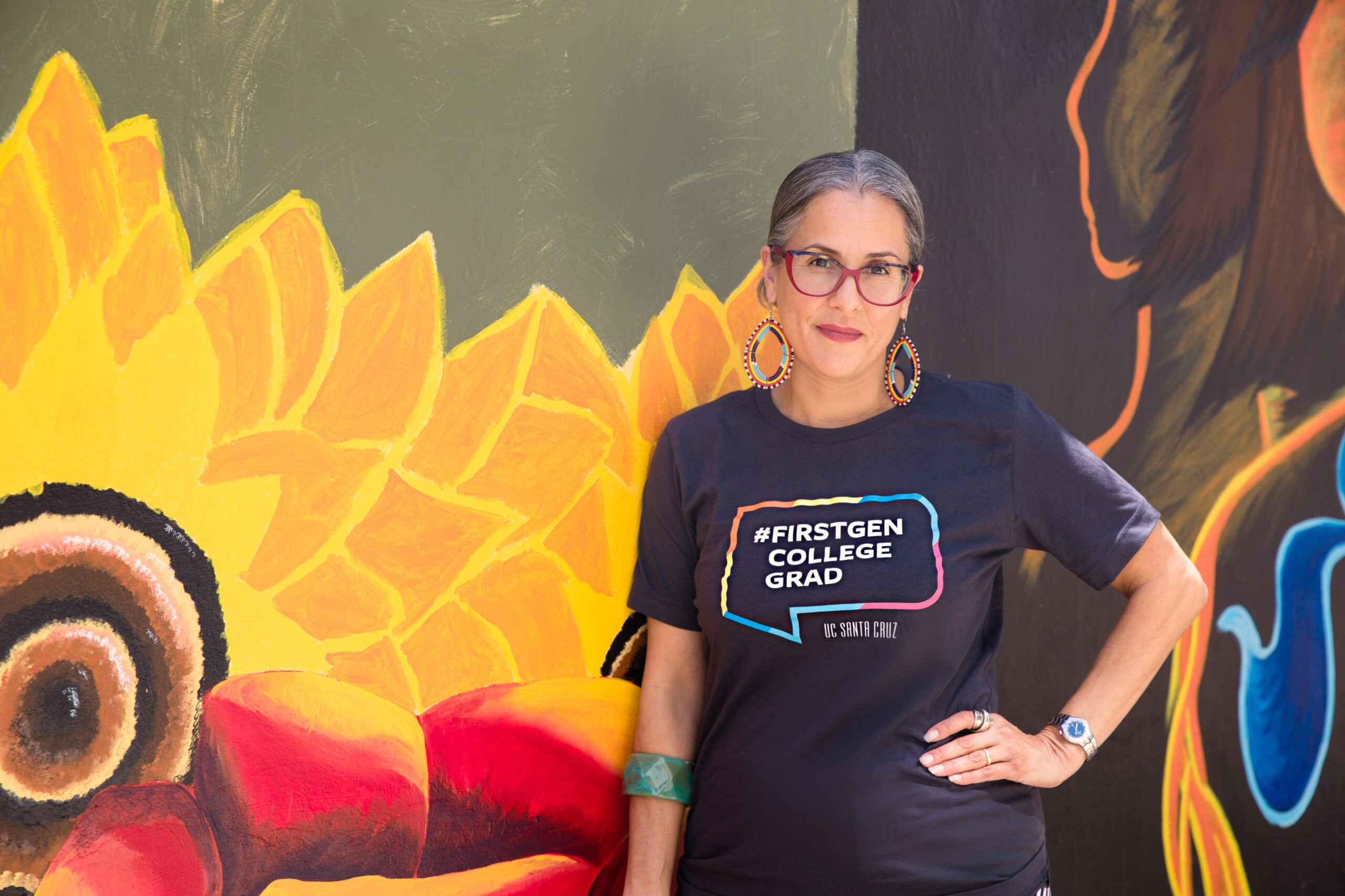Campus News
Three University of California, Santa Cruz professors receive Mellon Foundation Affirming Multivocal Humanities grants
The Mellon Foundation has awarded three University of California, Santa Cruz, departments prestigious grants of $100,000 each for work that champions groundbreaking research in the realms of race, ethnicity, gender, and sexuality.




The Mellon Foundation has awarded three University of California, Santa Cruz, departments grants of $100,000 each for work that champions groundbreaking research in the realms of race, ethnicity, gender, and sexuality.
Part of Mellon’s Affirming Multivocal Humanities initiative, the grants bolster the work of UC Santa Cruz’s Critical Race & Ethnic Studies (CRES), Feminist Studies (FMST), and Latin American and Latino Studies (LALS) Departments. CRES Professor Christine Hong, Associate Professor of FMST Madhavi Murty, and LALS Professor and chair Catherine Ramírez were invited by Mellon to submit proposals for funding.
The term “Affirming Multivocal Humanities” refers to scholarship on the breadth of the human experience through race, ethnic, gender, and sexuality studies.
“The study of race, gender, and sexuality has become ever more central to work in the humanities over the last thirty years or so,” said Mellon Foundation Director of Higher Learning Phillip Brian Harper, “and it is important that inquiry in these areas—which is of perennial interest to students—continue to enjoy robust support.”
“Affirming Multivocal Humanities is an initiative that champions the insightful scholarship and teaching taking place in these disciplines—those that are too often undervalued and even undermined in American society today,” said Mellon Foundation President Elizabeth Alexander. “We are proud to support colleges and universities in the United States that are advancing deep research and curricular engagement with the stories and histories of our country’s vast diversity and the modes of inquiry that race, gender, and ethnic studies explore and expand.”
Localizing ethnic studies curriculum
Christine Hong said that the Mellon grant has made it possible to make headway on a community-collaborative research partnership that focuses on localizing ethnic studies in Santa Cruz.
“The community-collaborative research project was launched in response to a series of California laws first recommending and then requiring ethnic studies in high school education throughout the state,” said Hong, who directs the Center for Racial Justice at UC Santa Cruz, co-chairs the UC Ethnic Studies Faculty Council, and co-edits the activist scholarly journal, Critical Ethnic Studies.
UC Santa Cruz’s Center for Racial Justice has worked with campus faculty in Critical Race and Ethnic Studies and Education, local K-12 teachers, and community organizations to begin co-constructing a localized ethnic studies archive that centers the past and present struggles of communities of color in the greater Santa Cruz area for justice.
“Our goal is to enable local high school students and UC Santa Cruz students to take active part in reimagining Santa Cruz against the implied whiteness of its ‘surf, sun, sustainable farming, and redwoods’ image by focusing on how race, racism, and racialization have shaped local histories, practices of resistance, and community organizing,” Hong said.
This past year, she and Professor Jennifer Kelly (FMST/CRES), with the support of the History and Civics Project led by Education Department lecturer Daisy Martin and Mark Gomez as well as a community partner, the Resource Center for Nonviolence, offered a yearlong series of workshops on the foundations of ethnic studies for local K-12 teachers and community organizers. The last workshop, on community archiving and oral histories, will be held in early May.
Public events build on 50 years of impact in feminist studies
Murty said that the grant could not be more timely for the Feminist Studies department at UC Santa Cruz, which was established 50 years ago, first as a program in Women’s Studies. The program became a department in 1996. As it re-defined its epistemological emphasis through feminist analytics, it became the first in the nation to change its name to Feminist Studies in 2005.
“The Affirming Multivocal Humanities grant from the Mellon Foundation is enabling us to celebrate this occasion through a series of events to discuss the significance of feminist analytics, organizing and pedagogical practices in the contemporary moment in the United States, raise awareness about the field in the communities within which the university and the department resides, and expand our outreach beyond university walls to reach broader audiences in the spirit of democratizing feminism, given the urgency of now,” Murty said.
On March 1st, Murty, her co-PI, Prof Gina Athena Ulysse and other members of the department gathered with the authors of Let This Radicalize You: Organizing and the Revolution of Reciprocal Care, at a public forum on community activism, held at the Resource Center for Nonviolence in Santa Cruz.
The forum featured author activists Kelly Hayes and Mariame Kaba in conversation with UCSC professors Gina Dent (FMST), Debbie Gould (SOC), and Christine Hong (CRES/LIT).
“UC Santa Cruz students and representatives from many local non-profit groups attended to participate in a generative discussion on how to address the vital challenge of organizing in our current conjuncture – a moment in historical time that has brought together a range of both violent and hopeful forces creating a terrain for struggle,” Murty said.
In the spring, the Feminist Studies’ keystone event will be the 2nd Annual FMST Undergraduate Research Symposium.
“The FMST Symposium debuted in 2023 to great success, and this year, we’re planning a two-day Symposium on May 16 and 17 as part of the 50th anniversary slate of events,” Murty continued. “The Symposium will showcase the wide range of research that our students are engaged with in FMST coursework and include a discussion with faculty across campus who work with feminist epistemologies,” she added.
New courses and new connections for Latin American and Latino Studies
LALS’s Mellon grant is supporting three initiatives in that department: “Fashioning Latinidades: Latinx Style, Aesthetics, and Consumption,” “Amplifying Latinx Studies,” and “Placing Justice and Joy in Latinx Studies.”
“Together, these initiatives are supporting course development, graduate student research, faculty training, the promotion of a clear understanding of the significance of Latinx studies among the general public, networking with colleagues at other institutions in order to amplify the effects of work in our field, and in-person gatherings,” Ramírez said.
“One of the greatest challenges Latin American and Latino Studies faces is the misperception of our field as limited to a particular region or demographic,” she said. “Our colleagues, students, and I welcome the opportunity not only to support our students and to expand our curriculum—undertakings this grant is supporting—but also to promote a clear understanding of the significance and value of Latinx studies—particularly at an Hispanic-Serving Institution like UC Santa Cruz.”
With the grant’s support, LALS faculty and affiliates took part in a public writing workshop led by the editor of The Washington Post’s “Made by History” section last fall, and a delegation of LALS faculty, students, and staff attended the 2024 Latinx Studies Association conference in Tempe, Arizona, in April. Graduate student Edward Salazar Celis is also developing a course, “Fashioning Latinidades,” based on his research on Latinx style, aesthetics, and consumption.
“Fashion’s politics, materialities, and poetics have been a fundamental site for struggle, meaning-making, creativity, and representation within Latinx communities,” Salazar Celis said. “Fashion also produces and reproduces colonial hierarchies and divisions that have affected humans and nature and must be questioned. Expanding Latinx studies through the lens of fashion opens the space to reflect on these issues, exploring the past, present, and futurity of Latinxness through the dressed body.”
Salazar Celis and LALS graduate student Jennifer Gottlieb will attend the 2024 Crossing Latinidades Summer Institute at the University of Illinois, Chicago. Both are now being considered for 2024-25 Crossing Latinidades Andrew W. Mellon Foundation Pre-Dissertation Fellowships.